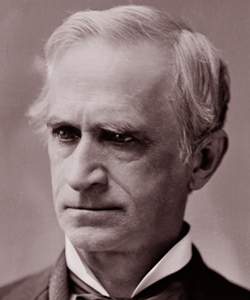Eli Saulsbury (Congressional Biographical Directory)
Reference
SAULSBURY, Eli, (brother of Willard Saulsbury, uncle of Willard Saulsbury, Jr.), a Senator from Delaware; born in Mispillion Hundred, Kent County, Del., December 29, 1817; attended the common schools and Dickinson College, Carlisle, Pa.; member, State house of representatives 1853-1854; moved to Dover, Del., in 1856; studied law; admitted to the bar in 1857 and practiced in Dover; elected as a Democrat to the United States Senate in 1871; reelected in 1876 and 1883 and served from March 4, 1871, to March 3, 1889; unsuccessful candidate for reelection; chairman, Committee on Privileges and Elections (Forty-sixth Congress), Committee on Engrossed Bills (Forty-seventh through Fiftieth Congresses); resumed the practice of his profession; died in Dover, Kent County, Del., March 22, 1893; interment in Silver Lake Cemetery.
“Saulsbury, Eli,” Biographical Directory of the United States Congress, 1774 to Present, http://bioguide.congress.gov/scripts/biodisplay.pl?index=S000072.
Eli Saulsbury (Dickinson Chronicles)
Scholarship
Eli Saulsbury was born as the middle child of three sons of William and Margaret Smith Saulsbury, wealthy landowners in Kent County, Delaware, on December 29, 1817. He was schooled locally and entered Dickinson College in Carlisle, Pennsylvania with the class of 1843 in 1839. A member of Belle Lettres Literary Society, he remained at the College for only one year before returning to the family estate.
He became a representative for his home state in 1853 and was admitted to the Delaware Bar in 1857, beginning a law practice in Dover. The three Saulsbury siblings, all staunch democrats, were active in politics. His younger brother Willard, Dickinson class of 1842, served as a United States senator and his elder brother, Gove, was governor of Delaware. In 1871 Willard retired, and supported Eli in his successful bid against Gove to fill the vacancy.
Eli Saulsbury served three terms in the United States Senate, including a stint on the Committee on Privileges and Elections. His public service came to an end in the election of 1888, when political divisions enabled the Republicans to claim the seat. Defeated, he returned to his estate in Delaware. Eli Saulsbury died on March 22, 1893. He was never married.
He became a representative for his home state in 1853 and was admitted to the Delaware Bar in 1857, beginning a law practice in Dover. The three Saulsbury siblings, all staunch democrats, were active in politics. His younger brother Willard, Dickinson class of 1842, served as a United States senator and his elder brother, Gove, was governor of Delaware. In 1871 Willard retired, and supported Eli in his successful bid against Gove to fill the vacancy.
Eli Saulsbury served three terms in the United States Senate, including a stint on the Committee on Privileges and Elections. His public service came to an end in the election of 1888, when political divisions enabled the Republicans to claim the seat. Defeated, he returned to his estate in Delaware. Eli Saulsbury died on March 22, 1893. He was never married.
John Osborne and James W. Gerencser, eds., “Eli Saulsbury,” Dickinson Chronicles, http://chronicles.dickinson.edu/encyclo/s/ed_saulsburyE.htm.



